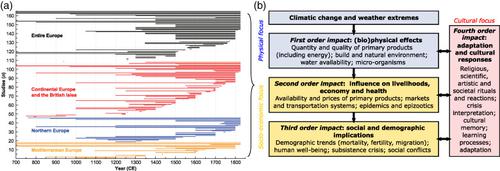当前位置:
X-MOL 学术
›
WIREs Clim. Chang.
›
论文详情
Our official English website, www.x-mol.net, welcomes your feedback! (Note: you will need to create a separate account there.)
Climate and society in European history
WIREs Climate Change ( IF 9.2 ) Pub Date : 2020-11-19 , DOI: 10.1002/wcc.691 Fredrik Charpentier Ljungqvist 1, 2, 3 , Andrea Seim 4, 5 , Heli Huhtamaa 6, 7
WIREs Climate Change ( IF 9.2 ) Pub Date : 2020-11-19 , DOI: 10.1002/wcc.691 Fredrik Charpentier Ljungqvist 1, 2, 3 , Andrea Seim 4, 5 , Heli Huhtamaa 6, 7
Affiliation

|
This article evaluates 165 studies from various disciplines, published between 2000 and 2019, which in different ways link past climate variability and change to human history in medieval and early modern Europe (here, c. 700–1815 CE). Within this review, we focus on the identification and interpretation of causal links between changes in climate and in human societies. A revised climate–society impact order model of historical climate–society interactions is presented and applied to structure the findings of the past 20 years' scholarship. Despite considerable progress in research about past climate–society relations, partly expedited by new palaeoclimate data, we identify limitations to knowledge, including geographical biases, a disproportional attention to extremely cold periods, and a focus on crises. Furthermore, recent scholarship shows that the limitations with particular disciplinary approaches can be successfully overcome through interdisciplinary collaborations. We conclude the article by proposing recommendations for future directions of research in the climatic change–human history nexus.
中文翻译:

欧洲历史上的气候与社会
本文评估来自不同学科的165个研究,2000年和2019年,它以不同的方式在中世纪和早期现代欧洲(这里过去的气候变率和变化链接到人类的历史,期间发表Ç。公元700–1815年)。在这篇综述中,我们着重于确定和解释气候变化和人类社会之间的因果关系。提出了修订后的气候-社会相互作用的气候-社会影响顺序模型,并将其应用于构建过去20年奖学金的结果。尽管过去的气候与社会关系的研究取得了相当大的进展,而新的古气候数据在一定程度上推动了这一进程,但我们仍发现了知识的局限性,包括地理偏见,对极端寒冷时期的不成比例的关注以及对危机的关注。此外,最近的研究表明,通过跨学科合作可以成功克服特定学科方法的局限性。
更新日期:2020-11-19
中文翻译:

欧洲历史上的气候与社会
本文评估来自不同学科的165个研究,2000年和2019年,它以不同的方式在中世纪和早期现代欧洲(这里过去的气候变率和变化链接到人类的历史,期间发表Ç。公元700–1815年)。在这篇综述中,我们着重于确定和解释气候变化和人类社会之间的因果关系。提出了修订后的气候-社会相互作用的气候-社会影响顺序模型,并将其应用于构建过去20年奖学金的结果。尽管过去的气候与社会关系的研究取得了相当大的进展,而新的古气候数据在一定程度上推动了这一进程,但我们仍发现了知识的局限性,包括地理偏见,对极端寒冷时期的不成比例的关注以及对危机的关注。此外,最近的研究表明,通过跨学科合作可以成功克服特定学科方法的局限性。



























 京公网安备 11010802027423号
京公网安备 11010802027423号